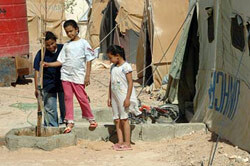The Electronic Intifada 30 July 2008

Palestinian children at al-Tanf camp between the Iraqi and Syrian border. (J.Wreford/UNHCR)
“There are contacts between the Iraqi government and Palestinian authorities to secure the return of these refugees either to their homes or other places inside Iraq and offer [them] protection and humanitarian aid,” Dalil al-Qasous, the Palestinian charge d’affaires in Baghdad, told IRIN.
According to al-Qasous, there are about 3,000 Palestinian refugees in the two camps: about 1,800 in al-Walid camp on the Iraqi side of the border, and about 1,000 in al-Tanf in no man’s land between Iraq and Syria.
“They are still experiencing an acute humanitarian situation and daily suffering compounded by high summer temperatures, sandstorms and lack of medical care,” he said.
Al-Qasous said security in parts of Iraq was better now than before “and because of that we are thinking of relocating them to safe areas [in Iraq].”
The refugees had earlier turned down an offer to go to Sudan, citing security concerns.
In search of a lasting solution
In a statement on 15 July, Washington-based Refugees International said relocating Palestinian refugees to Sudan “is not a lasting solution”, and called on the US government to urgently resettle them.
“Relocating Palestinian refugees to Sudan does not offer this population a real choice for a permanent, stable home, and simply moves them from one marginalized situation to another,” said Kristele Younes, senior advocate with Refugees International.
“Most of these people are afraid to go to Sudan, especially now that charges were filed against the Sudanese president by the International Criminal Court,” Younes said.
Some 34,000 stateless Palestinians were living in Iraq before the US-led invasion in 2003 when their community started to face persecution at the hands of armed groups who accused them of loyalty to the Saddam Hussein regime.
This item comes to you via IRIN, a UN humanitarian news and information service, but may not necessarily reflect the views of the United Nations or its agencies. All IRIN material may be reposted or reprinted free-of-charge; refer to the copyright page for conditions of use. IRIN is a project of the UN Office for the Coordination of Humanitarian Affairs.


